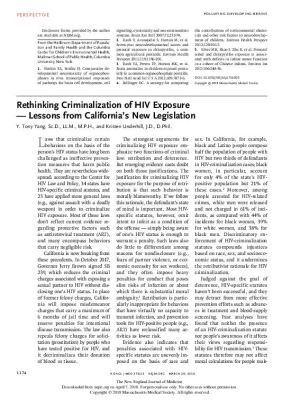Rethinking Criminalization of HIV Exposure — Lessons from California’s New Legislation
Argues that laws criminalising HIV exposure fail to satisfy criminal law functions of retribution and deterrence. Retribution is problematic as laws are applied when no intention to transmit HIV, little to no likelihood of transmission and multiple factors may make disclosure difficult. Laws fail to deter unprotected sex and are a poor fit for acts that include no risk of transmission, including sex and blood donation. Instead, laws cause harm, with discriminatory enforcement compounding injustice and stigma. California’s law reform is commendable, while other problematic U.S. HIV-criminalisation statutes should be restructured, amended, or repealed.

